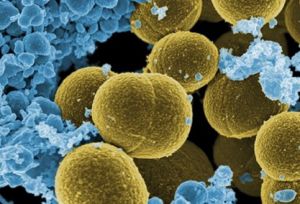La respuesta la dan en la presente investigación. Las bacterias denominadas no competentes sí se sirven de genes de competencia para incorporar ADN extracelular. Pero no emplean este material para modificar su genoma “sino que los usan como comida y para arreglar su genoma”.
Cuando infectan a un hospedador, las bacterias patógenas deben hacer frente a un entorno hostil, causado principalmente por la actuación de células inmunitarias enviadas al sitio de la infección. El éxito de un patógeno residirá, en parte, en su capacidad para luchar y sobrevivir a las defensas inmunes, que tienen dos efectos fundamentales sobre las bacterias. El primero consiste en mermar la eficiencia de la bacteria para la obtención de nutrientes y energía mediante procesos convencionales. El segundo supone el daño en el genoma del agente invasor.
Julia García-Fernández, investigadora del CNB y una de las primeras autoras del trabajo explica, “en esta situación, S. aureus induce esta maquinaria, que actúa en dos sentidos, por un lado, redirige el metabolismo para crecer de manera más lenta y capta ADN exógeno que le va a permitir reparar el daño producido en su material genético. “
Adaptación a la respuesta inmunitaria
S. aureus es un patógeno que se asocia a infecciones hospitalarias, algunas de ellas mortales, en diferentes tejidos y órganos como la piel, las vías respiratorias o los huesos. Sin embargo, su prevalencia ha ido en aumento lo que incluye también su mayor presencia en ambientes comunitarios, como centros educativos o cárceles, donde las personas afectadas no se caracterizan por un sistema inmune debilitado.
Parte del éxito de S. aureus, además de por la adquisición de resistencia a los antibióticos, reside en la capacidad del microorganismo de adaptarse metabólicamente a la respuesta inmune del hospedador. El equipo del CNB-CSIC ha podido descifrar ahora que dicha respuesta se produce gracias al gen de competencia natural comk, cuya función conocida hasta el momento era el transporte de ADN exógeno.
El daño que se produce en el ADN bacteriano durante la infección es debido a los radicales libres Especies Reactivas de Oxígeno (ROS) producidos por las células inmunes en su lucha contra S. aureus. La actuación de comk permite reparar el genoma.
Además, durante la infección, el sistema inmune dificulta la respiración de S. aureus. El plan B de la bacteria supone pasar a la fermentación como mecanismo de respiración celular. Pero este sistema es mucho menos eficiente en lo referente al uso de glucosa. Los investigadores han determinado la función de comk en la mejora del flujo del metabolismo de la glucosa para que pueda fermentar competitivamente.
Posibilidad terapéutica
El equipo puso a prueba la nueva función y pudo observar que, al atacar dicha maquinaria, las bacterias no eran capaces de infectar y acababan muriendo. “Es un avance importante, no solo a nivel académico, sino que el mecanismo tiene una funcionalidad muy relevante a la hora bloquear infecciones”, apunta López.
La investigación abre la puerta al desarrollo de moléculas dirigidas al gen comk como posibilidad terapéutica. La terapia actuaría como ayuda al sistema inmune evitando la fermentación eficiente y la reparación genética de la bacteria. El grupo de López en el CNB trabaja en esa dirección mediante el cribado por ordenador de compuestos que inhiban los genes de competencia natural.
Referencia Científica
Cordero, M., García-Fernández, J., Acosta, I.C. et al. The induction of natural competence adapts staphylococcal metabolism to infection. Nat Commun 13, 1525 (2022). https://doi.org/10.1038/s41467-022-29206-7
Leyre Flamarique / Contenido realizado dentro del Programa de Ayudas CSIC-Fundación BBVA de Comunicación Científica, convocatoria 2021






